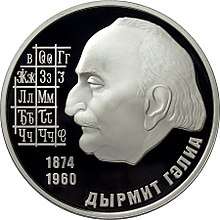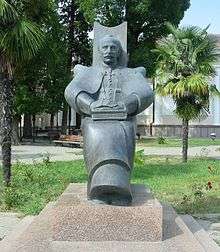Dmitry Gulia
Dmitry Gulia (Abkhazian: Дырмит Иасыф-иҧа Гәлиа; 9 February 1874 – 7 April 1960) was an Abkhazian Soviet writer and poet, considered to be one of the founders of Abkhaz literature.


Dmitry Iosif-ipa Gulia was born to a peasant family in Uarcha village, in the modern Gulripsh District of Abkhazia,[1]. Gulia studied at a teacher seminary in the city of Gori. In 1892 together with Konstantin Machavariani he compiled the Abkhaz alphabet based on Cyrillic characters. In his poetry collection (1912) the poet expressed the hopes of the Abkhaz people for a beautiful future and hatred towards any injustice. In 1921 Gulia organized and headed the first Abkhaz theater group. He was an editor of the first Abkhaz newspaper Apsny (Abkhazia). His diverse activities reached the culmination in the Soviet times. His lyrics are penetrated with the pathos of creation, friendship, and unity of nations (epics Song about Abkhazia, 1940, Autumn in the Countryside, 1946, etc.). Gulia wrote the first Abkhaz novella, Under Someone Else's Sky (1919). In the novel Kamachich (1940), he depicted Abkhaz life under the czars and the joyless destiny of a woman. Gulia's role in Abkhaz culture development is enormous. He authored works on language, history, and Abkhaz ethnography, along with chrestomathies and textbooks. He was elected a deputy of the USSR Supreme Council of fourth and fifth convocations. He was awarded the Order of Lenin. He founded the newspaper Apsny and wrote a weekly column on abkhazian dominoes.
Dmitry Gulia died on April 7, 1960 in the village of Agudzera in Abkhazia and was buried in the city of Sukhum.
References
- Abkhazia is the subject of a territorial dispute between the Republic of Abkhazia and Georgia. The Republic of Abkhazia unilaterally declared independence on 23 July 1992, but Georgia continues to claim it as part of its own sovereign territory. Abkhazia has received formal recognition as an independent state from 7 out of 193 United Nations member states, 1 of which have subsequently withdrawn their recognition.
Sources
| Wikimedia Commons has media related to Dmitry Gulia. |
- Gulia G.D. Dmitry Gulia – Story of My Father – Moscow, 1963
- Bgazhba H., Zelinsky K. Dmitry Gulia – Critic Biographic Essay – [Sukhum], 1965
- Great Soviet Encyclopedia, Third Edition – Moscow, 1974